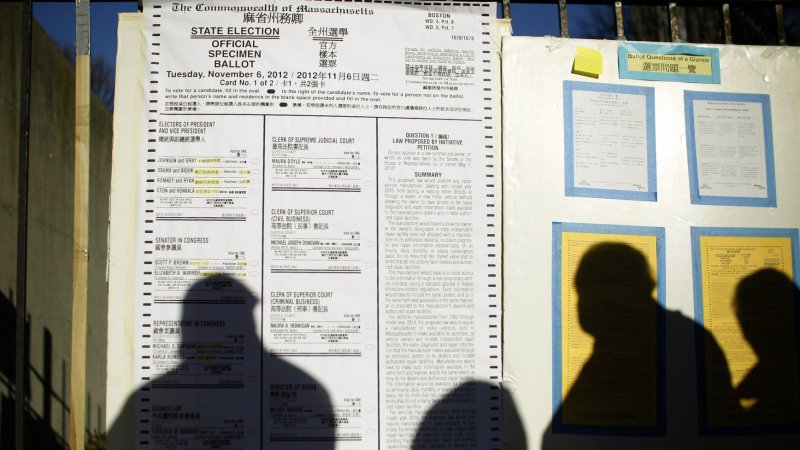1 of 2 | A line of people waiting to vote cast a shadow over a large display of the Massachusetts ballot on election day in Boston, Massachusetts on November 6, 2012. UPI/Matthew Healey |
License Photo
While the majority party changed in the Minnesota and Colorado legislatures on Election Day 2012, the balance of power between Republicans and Democrats was largely unchanged.
While 201 House and Senate seats were in play in Minnesota, a net gain of 11 seats gave the Democratic-Farmer-Labor Party control of both houses in Minnesota. Gov. Mark Dayton also is a Democrat.
State DFL Chairman Ken Martin told the Minneapolis Star Tribune Election Night there was "an amazing turnout around the country and around the state for President Obama and the reality is that that's going to translate into votes for our legislative candidates."
The National Conference of State Legislature said the 2012 election saw a drop in the number of states with divided government, in which a governor of one party and at least one chamber of the Legislature are of opposite party.
After the election the number of states with a unified Democratic government was 14, unified Republican, 23, and divided, 12.
In the first state legislative election since the 2010 redistricting, voters cast ballots in 44 states for a collective 6,034 state legislative seats, NCSL said. Democrats regained control of seven chambers they had lost in 2010, but Republicans claimed four chambers previously controlled by the Democrats.
NCSL said the surprise of Election Night was the New Hampshire House where Democrats won a majority. Heading into the election Republicans had a 288-102 margin.
Thanks to a victory in Arkansas, Republicans gained control of the old South, turning the once solidly Democratic 11 states into red territory.
Republicans also took back the Wisconsin Senate while holding onto the Assembly. The Senate had been in Democrats' hands for a few months since recalls flipped Senate seats in the summer.
Republicans maintained their edge over Democrats in governors' offices as well.
In Washington state, Democratic former U.S. Rep. Jay Inslee bested state Attorney General Rob McKenna in the battle to succeed outgoing Democratic Gov. Chris Gregoire.
Voters in North Carolina elected Republican Pat McCrory over Democrat Walter Dayton to succeed departing Democratic Gov. Bev Perdue.
Incumbent Democratic Gov. Jay Nixon defeated Republican challenger Dave Spence in Missouri, and West Virginia Gov. Earl Ray Tomblin turned back a repeat challenge by Republican Bill Maloney.
Incumbent Democratic Delaware Gov. Jack Markell defeated Republican challenger Jeff Cragg, and voters in Vermont re-elected Democratic Gov. Peter Shumlin over GOP challenger Randy Brock.
Incumbent Republican Gov. Gary Herbert was the winner over Democrat Peter Cooke in Utah, and Republican Gov. Jack Dalrymple defeated Democratic challenger Ryan Taylor in North Dakota.
Republican U.S. Rep. Mike Pence left Washington and defeated Democratic nominee John Gregg in the race to succeed outgoing Republican Indiana Gov. Mitch Daniels.
In New Hampshire, Democrat Maggie Hassan defeated Republican nominee Ovide Lamontagne in the race to succeed outgoing Gov. John Lynch, a Democrat.
In Montana, Democrat Steve Bullock defeated Republican Rick Hill in the race to succeed outgoing Democratic Gov. Brian Schweitzer.
Soon after the results came in, the Republican Governors Association said the 30 GOP governorships nationwide is the highest number of state chief executives held by either party in 12 years.
"There's no doubt that the Republican Party's strength comes from the states, and the RGA's ability to expand our majority provides optimism for the future," said RGA Chairman Bob McDonnell, governor of Virginia, in a statement Nov. 6. "In the states, Republican governors are providing the type of results-oriented leadership. ... They've eliminated massive budget deficits while reducing the tax burden, reformed entitlements and long-term fiscal liabilities and enacted the most comprehensive education reforms in a generation."
The Democratic Governors Association, meanwhile, praised the effort to hold on to five of six competitive races.
"How did Democrats manage this?" Chairman Martin O'Malley, Maryland governor, wrote recently. "They focused above all on the top issues for voters: creating jobs and expanding opportunity."















